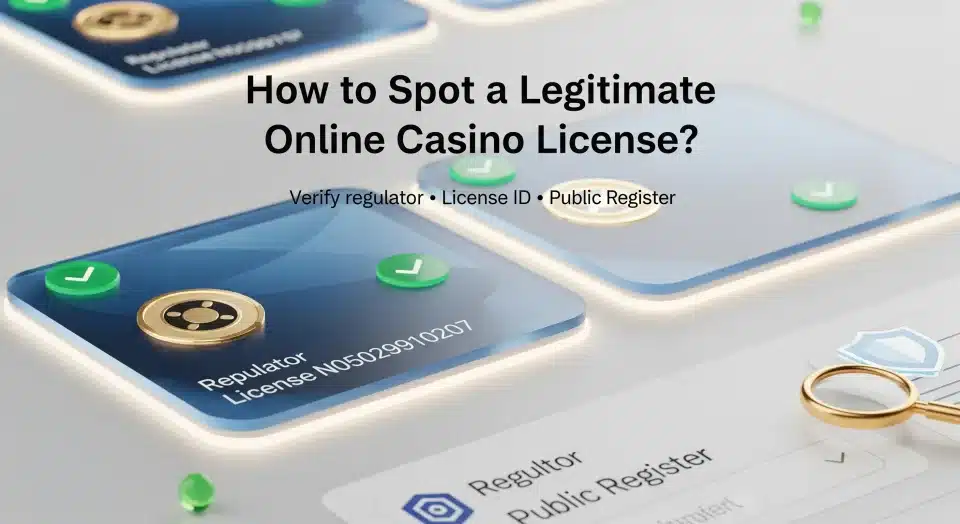How to spot a legitimate online casino license? Start with the basics: confirm the regulator, a real license number, and visible player-protection tools. A genuine online casino license is more than a footer badge—it connects to a public register, names the operating company, and lists the permissions and conditions the brand must follow.
The quick test (60–90 seconds) — verify a licensed online casino
-
Find jurisdiction + regulator in the footer or Terms.
-
Copy the license number (a specific ID, not just a logo).
-
Search the public register and locate the company by license ID or legal name.
-
Match details: entity name, trading names, approved remote casino scope, and listed domains.
-
Check status/dates and any restrictions or sanctions.
If any step fails, you’re likely not looking at a legitimate online casino license—pick another brand.
(You can confirm status on the official gambling regulator public register.)
(Fairness claims are stronger when a site references an independent testing lab for casino games.)
What a real casino license covers (why it protects you)
A legitimate online casino license binds the operator to concrete standards:
-
Identifiable company tied to the license (legal name, address, registration).
-
Correct scope (slots/table games under remote casino, not just betting/B2B).
-
Responsible-gambling tools: set deposit limits, timeouts, self-exclusion, and session reminders.
-
Complaints/ADR: a recognized escalation path beyond customer support.
-
AML & ongoing audits: ongoing oversight, not a one-off approval.
These requirements make a licensed online casino safer and more predictable.
Step-by-step: confirm a legitimate online casino license (repeatable)
-
Identify the exact regulator and copy the license number.
-
Use the public register to verify the license is active and matches the brand.
-
Match the corporate footprint: the register’s company must match the site’s About/Terms, including domains and trading names.
-
Confirm permissions include remote casino (online slots/table games).
-
Scan conditions & actions for warnings, restrictions, or past sanctions.
-
Test RG tools in the cashier: you should quickly find deposit limits and timeouts.
-
Read T&Cs: wagering rules, game-weighting tables, KYC/withdrawal timelines, and the ADR route should be clear.
Read the site like an auditor (practical cues)
-
Footer transparency: Prefer a full line like “Licensed and regulated by … (License No. XXXX)” over a lone badge.
-
RG visibility: Tools should be near the cashier—buried settings are a warning sign for a licensed online casino.
-
KYC clarity: Required documents, review timeframes, and payout rules should be in plain English.
-
Bonus clarity: A legitimate online casino license culture shows with specifics—wagering base (bonus-only vs deposit+bonus vs spin-wins), max bet while wagering, time limits, and any max cashout.
-
Providers & RTP: Listing game providers and RTP ranges adds transparency.
Fairness checks beyond the online casino license
A license is the floor, not the ceiling. Add these for extra confidence:
-
Independent testing (RNG/RTP) from a recognized lab.
-
Update logs for policy and RG changes (shows operational discipline).
-
Support & escalation that match what the register lists.
Red flags that usually mean “move on”
-
No license number (only a logo or vague claim).
-
The “license” link hits a homepage/404, not a specific listing.
-
Company/domain mismatch between the site and register.
-
Missing deposit limits or self-exclusion in the cashier.
-
Surprise fees or unclear withdrawal timelines after signup.
-
Fake regulator/test-lab seals (images without real links).
Bonuses, wagering, and a licensed online casino
Legit operators still use bonuses—but they publish the rules up front:
-
The multiplier and base (bonus-only vs deposit+bonus vs spin-winnings).
-
Game weighting, max bet during wagering, time limits, and any max cashout.
-
Whether the deal is sticky or non-sticky, with examples.
Copy/paste verification checklist (fast re-use)
-
Regulator name + license number in the footer
-
Live register record: active, correct company/domains, correct online casino license scope
-
Responsible-gambling tools visible (set deposit limits, timeouts, self-exclusion)
-
Fairness mentions (RNG/RTP, recognized lab)
-
Clear T&Cs (wagering, KYC/withdrawals, ADR route)
-
Reachable support and a stated escalation path
FAQs — How to spot a legitimate online casino license?
Can a site show a regulator logo without a real listing?
Yes. Always click through the public register and match the company and ID to prove the online casino license exists.
Does a valid license guarantee safety?
It’s the baseline. Still verify RG tools, a testing-lab reference, and plain-English T&Cs.
What if I can’t find the license number?
Treat the brand as unverified and choose a licensed online casino you can confirm quickly.
Final verdict: how to spot a legitimate online casino license
How to spot a legitimate online casino license? Confirm the regulator and license ID on the public register, match company and domains, check responsible-gambling tools, and review T&Cs. If any step fails, choose another licensed online casino—there are plenty you can verify in minutes.

